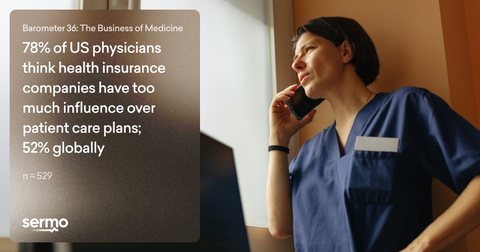Sermo Barometer Finds 78% of US Physicians Think Health Insurance Companies Have Too Much Influence Over Patient Care Plans; 52% Globally
The 36th Barometer from Sermo, a fast, frictionless HCP engagement platform providing the healthcare industry with real-time business insights and authentic physician touch points, revealed that 78% of U.S. physicians feel health insurance companies have too much influence in determining which treatments and procedures are approved for patients; this declines to 52% globally and 38% in Europe.
This press release features multimedia. View the full release here: https://www.businesswire.com/news/home/20250130567857/en/

Sermo Barometer Finds 78% of US Physicians Think Health Insurance Companies Have Too Much Influence Over Patient Care Plans; 52% Globally (Graphic: Business Wire)
“Navigating health insurance policies has become one of the most significant obstacles to providing care,” explains Dr. Shivang Joshi, MD, MPH, RPh, FAHS, Director of Headache Medicine at Community Neuroscience Services in Westborough, MA, and Sermo Medical Advisory Board Member. “Every day, we find ourselves in battles over approvals for medications or procedures we know our patients desperately need. The frustration comes from knowing that these decisions are often made by individuals who lack the specific medical expertise and simply follow antiquated algorithms, yet hold immense power over care decisions. It’s heartbreaking to explain to a patient that their care is delayed—not because of medical reasons, but because of their insurance.“
U.S. Doctors Are Concerned About Private Equity’s Negative Impacts on Healthcare Dynamics
Half (54%) of U.S. physicians feel private equity investments have decreased the quality of care provided to patients, with 26% feeling that private equity investment leads to a significant decline in quality of care. Only 2% of U.S. physicians felt private equity investment significantly improved the quality of care. The challenges of U.S. physicians operating in private equity systems prioritizing profits are well-documented. A recent NIH study found that hospitals purchased by private equity firms had a substantial increase in infections, falls, and other adverse events.
North America is the largest market for private equity deals in healthcare, representing 65% of global deal value. Despite potential fallbacks, many practice owners likely see private equity as an attractive option due to the financial implications administrative burden has on their practices.
Sentiments among European physicians tilted more in favor of private equity investments in healthcare, with 50% believing private equity investment has had a moderate to significant improvement in the quality of care for their patients.
Do Value-Based Care Models Really Deliver Value?
Clinical outcomes, patient access to care, and population health management are ranked as the top indicators of a successful value-based care system, according to the survey. These metrics are in contrast with how insurance providers evaluate value-based care models. The Centers for Medicare & Medicaid Services (CMS) relies heavily on hospital readmissions as a metric when determining payment to hospitals. Only 1% of U.S.-based physicians ranked readmission rates as their first choice on how they’d evaluate a value-based care model.
Under CMS, hospitals with higher patient satisfaction scores can earn additional payments. Only 4% of US physicians ranked patient satisfaction scores as their first choice on how they’d evaluate a value-care model.
Physicians Face Financial Uncertainty in Retirement Planning
Worldwide physicians' biggest financial concerns related to retirement are increased cost of living, insufficient retirement savings, and uncertainty around national social security systems. In the U.S., changes in reimbursement rates, market volatility, and increased cost of living were the top concerns. No other country had changes in reimbursement rates as a top concern.
Regarding retirement preparedness, only 22% feel fully prepared. 52% reported they don’t have a secondary source of income but are considering one; 26% already have a secondary source of income.
According to Dr. Ashish Rana, MD, Internal Medicine Program Director and Associate Chair of Academic Medicine at Crozer Health in Upland, PA, as well as Professor of Medicine at Drexel University College of Medicine and Sermo Medical Advisory Board Member, “Retirement planning feels like navigating a moving target—it’s full of uncertainty and constant change. It’s not just about saving enough; it’s about managing the fear that market volatility or sudden policy shifts could upend years of careful planning. This is why so many of us are considering secondary income sources or adjusting our retirement timelines.”
This survey was fielded on January 21st, 2025 as the 36th edition of Sermo’s ongoing Barometer study. The survey included 529 global physicians across various specialties, including General/Family Practice, Cardiology, Dermatology, Endocrinology, Gastroenterology, Neurology, OB/GYN, Oncology, Pediatrics, and Psychiatry in the United States, Canada and Europe, including United Kingdom, France, Germany, Italy and Spain. To explore more findings, visit: https://app.sermo.com/barometer
About Sermo:
Sermo is a fast, frictionless physician engagement platform providing the healthcare industry with real-time business insights and authentic physician touchpoints through our global community of 1M+ healthcare professionals and state-of-the-art technology. For over 20 years, Sermo has been turning physician experience, expertise, and observations into actionable insights that benefit pharmaceutical companies, healthcare partners, and the medical community at large. To learn more, visit www.sermo.com.
View source version on businesswire.com: https://www.businesswire.com/news/home/20250130567857/en/
Legal Disclaimer:
EIN Presswire provides this news content "as is" without warranty of any kind. We do not accept any responsibility or liability for the accuracy, content, images, videos, licenses, completeness, legality, or reliability of the information contained in this article. If you have any complaints or copyright issues related to this article, kindly contact the author above.
